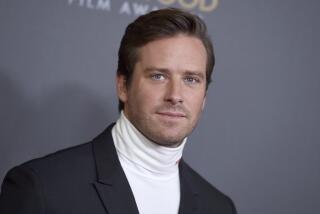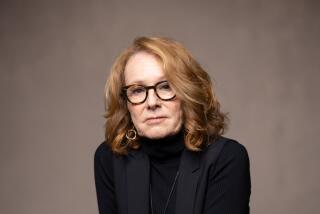THE OUTLOOK FOR OCCIDENTAL : A Larger-Than-Life Man Is Recalled
- Share via
The world greeted the death of industrialist and philanthropist Armand Hammer in as richly varied a way as it reacted to his life: with awe and praise for his endeavors on the international stage, tempered by diplomatic silence, criticism and even relief from some of his many antagonists.
Hammer, 92, the chairman of Occidental Petroleum Corp., died Monday night at his home in the Holmby Hills neighborhood of Los Angeles after a brief illness.
Hammer was lauded for his decades of unofficial diplomacy between the United States and the Soviet Union, his enormous financial support of cancer research, his business instincts that led to huge oil discoveries around the world and his creation of an eminent art collection that hangs in great museums.
But he was also remembered as the dupe of Libyan leaders whose eagerness to make money in the 1960s paved the way for the first global oil crisis and the rise of OPEC. And he was criticized as an extreme self-promoter and double-dealer who, among other deeds, incurred the wrath of the Los Angeles art community over his recent failure to keep a promise to the Los Angeles County Museum of Art .
Above all, Hammer was portrayed as larger than life.
“He was at the intersection of history so many times, in oil as in U.S.-Soviet relations,” said Daniel Yergin, author of “The Prize,” a history of oil politics. “He was there for the beginning of communism and there for the end of it. There’s nobody else who can say that.”
Hammer had long been suspect in some quarters for his close ties to the Soviet Union, which dated to powerful political and business contacts he forged there in the 1920s. His self-publicized diplomatic efforts, not always at the invitation of the White House, drew mixed reviews to the end.
Harvard University Sovietologist Marshall Goldman credited Hammer on Tuesday for playing a “very positive” role as messenger and intermediary between several U.S. administrations and the Soviets, helping to defuse such crises as the 1978 arrest of an International Harvester executive in Moscow.
“He was always claiming to have accomplished so much that people would pooh-pooh what he said,” said Goldman. “He left himself open for criticism when in fact there were concrete things that he was doing.”
In fact, Sen. Edward M. Kennedy (D-Mass.), who has supported efforts to award Hammer the Nobel Peace Prize, said Tuesday: “We could not have ended the Cold War without him . . . . Few private citizens in American history have done more to serve the public interest or the cause of international understanding.”
Soviet President Mikhail S. Gorbachev, through a spokesman, said, “Mr. Hammer is associated with some of the most valuable pages in Soviet history.” He sent “sincere condolences” to Hammer’s family.
But the White House had no comment on Hammer’s death, even though George Bush, as vice president, was among many prominent figures who contributed blurbs to the book jacket for Hammer’s last autobiography, “Hammer.”
Also declining to make the customary comment on the passing of a world figure Tuesday were former Secretary of State Henry Kissinger and former National Security Adviser Zbignew Brzezinski, who once called Hammer a “pretentious self-promoter.”
Others spoke darkly about Hammer’s Soviet ties. Arnold Beichman, a Soviet affairs scholar at the conservative Hoover Institution, described him as an “agent of influence” who was “very valuable to the Soviets.”
Despite his political battle through the 1980s with Hammer over Occidental’s effort to drill for oil in Pacific Palisades--a plan killed by Los Angeles voters in 1988--City Councilman Zev Yaroslavsky had nothing but good things to say about Hammer on Tuesday.
“He was someone who . . . believed in himself and in the art of the possible,” Yaroslavsky said. “He accomplished things others only dream about.”
In the oil industry, Hammer was long regarded as an outsider and a maverick, a reputation he earned in the 1960s when his fledgling Occidental Petroleum entered the big leagues of oil with massive discoveries in Libya.
To this day, oilmen hold Hammer in ill repute for his tactics in getting into Libya--and later, when he was desperate to avoid Libya’s seizure of the reserves, for breaking the long-established formula for splitting oil profits between governments and oil companies. The result was a newly emboldened OPEC, historians agree.
“I would say that his contribution was more to the shareholders of Occidental than to the industry,” said Richard Stegemeier, chairman of Unocal Corp. “Occidental was not known to be a great leader in research or innovative creativity that was shared with the industry. It was more of a company that looked out for itself and did a very good job at that.”
While Hammer’s name appeared on a number of autobiographies, one author of a more searching book on Hammer’s life could not help but express relief at news of his death.
Investigative reporter Steve Weinberg--author of a 1989 biography of Hammer, “Armand Hammer: The Untold Story”--has spent most of the last year preparing for a trial of Hammer’s defamation lawsuit against him and his British publisher. The trial was to begin in April in London.
Hammer objected to 173 passages in the book, Weinberg said Tuesday. But with Hammer dead, Weinberg’s attorneys and publisher expect the lawsuit to be dropped.
Hammer’s admirers acknowledged the depth of reactions this very public man provoked.
“Everyone had strong feelings about him,” said Dr. Robert Gale of UCLA, the bone-marrow transplant specialist whom Hammer flew to the Soviet Union to treat victims of the Chernobyl nuclear accident in 1986. “Either they liked him or they didn’t like him. He was a friend, a personal friend, so I’m very sad.”
Times staff writer Darrell Dawsey contributed to this story.
More to Read
Sign up for Essential California
The most important California stories and recommendations in your inbox every morning.
You may occasionally receive promotional content from the Los Angeles Times.










